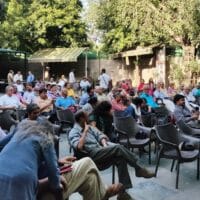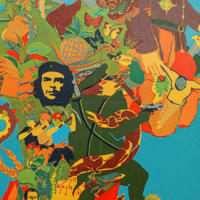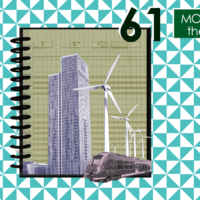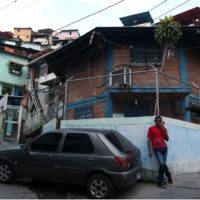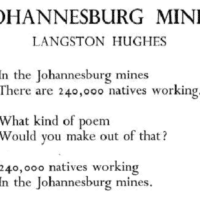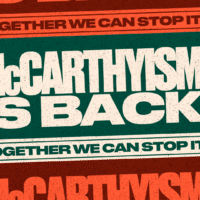-
EXCERPT: Colonial dreams, racist nightmares, liberated futures (from the introduction to ‘A Land With A People’)
…Zionism is the ideology that fuses creation of (ancient) Jewish collectivity with claims to (modern) sovereignty over land allegedly promised by God to Jews and their descendants.
-
Degrowth – How anti-worker would it be?
One accusation still seems to lack an adequate response: Is the U.S. working class inherently anti-degrowth because it would mean a massive loss of jobs?
-
Reparations for Black Americans w/ William A. Darity
We’re joined this month by William A.( “Sandy”) Darity to discuss reparations for Black Americans. A founding theorist of stratification economics and foremost scholar of the racial wealth gap in the United Stats, Darity is perhaps best known for his committed public advocacy for acknowledging, redressing, and resolving histories of racist violence against enslaved black people and their descendents through a federal program of reparations for black Americans.
-
50 detained, over 100 homes raided in sweeping crackdown on press freedom in India
Indian authorities carried out mass raids and detentions under the guise of the draconian UAPA on the morning of October 3, 2023.
-
Remembering Allende and his project ‘Cybersyn’
FIFTY years back, Pinochet’s coup destroyed Allende’s government and the structure of liberal democracy in Chile. Allende died with a machine gun in his hands, defending his attempt to build socialism in Chile against the combined power of the U.S. and the forces of reaction in Chile, including the military.
-
The World’s Most Dangerous Marxist | John Bellamy Foster | #182 HR
Foster explains Marx’s ecological critique of capitalism and how the concept of “metabolic rift” highlights the alienation between humans and nature caused by capitalism’s focus on profit over sustainability.
-
Marxism & Class
The working class makes the world go round. The working class should not be positioned as the most vulnerable in need of help, but as those who labour and deserve a just distribution of the fruits of their labour.
-
Dispatches from Atlanta and the Movement to Stop Cop City
Long Live Weelaunee.
-
Intellectual Property, Knowledge Monopoly, and the Rent Economy
Never before has society had the ability it does today to bring together different communities and resources in order to produce new knowledge. It is social, universal labour, and its private appropriation as intellectual property under capitalism stands in the way of liberating the enormous power of the collective to generate new knowledge and benefit people.
-
Othello and the War: Berlin Bulletin, September 11, 2023
The war in Ukraine, a horrific tragedy for the people of that unhappy country, fateful as well for many young Russians and potentially menacing for all the world, with burnished weapons of every size and destructive power waiting in silos or submarines for a slip, a blunder, a provocation.
-
Dossier no. 68: The coup against the Third World: Chile, 1973
The relationship between Chile, the curtailment of its socialist reforms, and the ongoing processes in other countries in the region and in the Global South more generally have been systematically erased in Chile, from official historiography and media narratives alike.
-
The People’s Ledger with Saule Omarova
This month, we discuss democratic possibilities for public finance with Saule Omarova, the Beth and Marc Goldberg Professor of Law at Cornell University and President Biden’s original nominee for Comptroller of the Currency. Her and Robert Hockett’s “finance franchise” metaphor for modern banking-–according to which the federal government is the franchisor and chartered banks are all franchisees–renders an often-times opaque system intuitive and readily politicizable.
-
U.S. Fighters in the Spanish Civil War: A Left Legacy in the Fight Against Fascism
“Brigadistas: An American Anti-Fascist in the Spanish Civil War” is a page-turner of a graphic novel, illuminating the courage and commitment of young Americans in the Abraham Lincoln Brigade, who put their lives on the line against fascism in Spain. The Brigadistas left behind a profound legacy of courage and international solidarity for the U.S. left that still resonates today.
-
Isabel Crook, longtime friend and supporter of Monthly Review, dies in Beijing at 107
Isabel was, and will remain, an inspiration to us and to everyone else who was privileged to know her. We extend our deepest condolences and sympathies to her sons, Michael, Carl and Paul, and to her whole extended family, and many comrades and friends.
-
The BRICS have changed the balance of forces, but they will not by themselves change the World: The Thirty Third Newsletter (2023)
Despite the limitations of the BRICS project, it is clear that the increase in South-South trade and the development of Southern institutions (for development financing, for instance) challenges the neo-colonial system even if it does not immediately transcend it.
-
How U.S. Sanctions Are a Tool of War: The Case of Venezuela
The U.S. sanctions imposed on Venezuela are by no means an isolated case, though they are some of the most severe. If the U.S. can’t win with tanks and guns, it hopes that a campaign to suffocate the people will expedite regime change.
-
Schism and Faschism: Berlin Bulletin no: 214, August 16, 2023
Again Victor Grossman turns to his faded history books, and to the uprisings—and then the defeat of divided leftists between 1919 and 1933. Where today is the LINKE, the party of peace, anti-fascism, anti-imperialism, socialism? It is in a crisis!
-
The Corporate Make-up of the Mining Industry in South Africa: Profit Survey 2023
The mining super-majors are keen to walk away from their legacy responsibilities, which in the case of South Africa date back to colonial times under British rule, continuing under apartheid, and in the last generation since 1994.
-
John Berger and Gramsci in Rome: Personal Reflections
“A week or so on, John Berger was still with me, there in spirit. Or, better, I was still with him. When in Rome, I told myself…well, what better thing to do than to visit Gramsci, the great Marxist, whose grave lies in the city’s ‘Non-Catholic Cemetery’ in Testaccio.”
-
McCarthyism Is Back: Together We Can Stop It
We stand together against the rise of a new McCarthyism that is targeting peace activists, critics of US foreign policy, and Chinese Americans. Despite increased intimidation, we remain steadfast in our mission to foster peace and international solidarity, countering the narrative of militarism, hostility, and fear.




